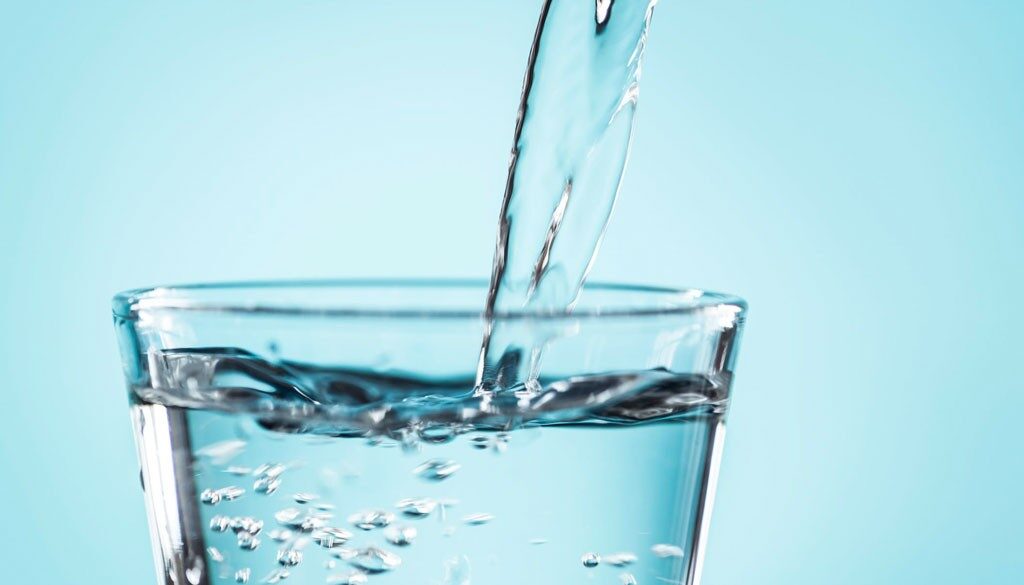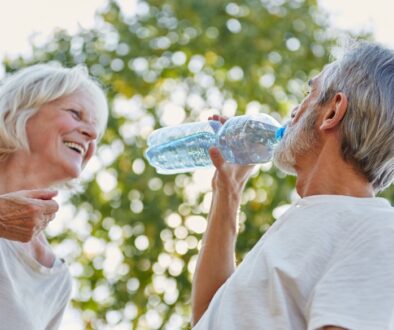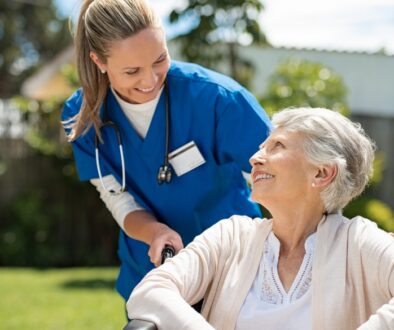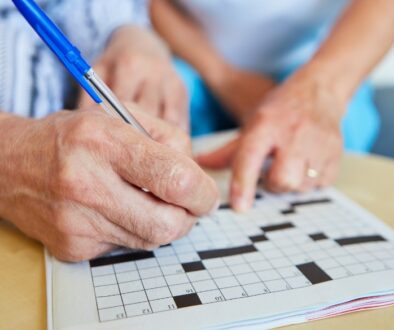8 Ways to Help Elderly Loved Ones Prevent Dehydration
You may have had the experience of offering an elderly loved one a drink, only to have them respond that they’re not thirsty right now, thank you very much. Unfortunately, this response often stems from a declining sense of thirst that’s part of the aging process – and it’s only the tip of the iceberg when it comes to the risk of dehydration in elderly adults.
Dehydration is defined as a loss of fluids and electrolytes and can have severe consequences for an elderly person, including death in some cases. In fact, the average age of patients admitted to the hospital is 80.4 years old, and according to national data, these patients are most likely women who live independently.
“As we get older we have a decreased sensation for thirst, so older adults don’t want to drink,” says geriatrician Nicol Joseph, medical director at VistaCare Hospice in Philadelphia and an associate professor in the department of geriatrics at the Philadelphia College of Osteopathic Medicine.
This means that your elderly loved ones who are used to drinking when they feel thirsty may not be able to tell when they need fluids. A recent study found that about one in 10 older adults drink three or fewer glasses of water daily and that roughly one in three drink four to six glasses daily, falling short of the recommended eight glasses per day. As a result, caregivers need to be proactive in providing fluids throughout the day, Joseph advises.
Losing the ability to feel thirst is just one reason why older adults are at increased risk of dehydration. There are a number of additional factors at play: elders may have trouble getting up to get something to drink, or they may worry about incontinence. Or they may be taking medications that raise their dehydration risk, depend on caregivers for their fluids or have swallowing problems that cause them to avoid drinking and eating, notes Michelle Katz, a healthcare advocate and author of “Healthcare Made Easy.”
“The more factors you have that could lead to water loss in your aging loved one, the more you will have to increase fluid intake,” says certified strength and conditioning specialist Chris Corpuz, owner of the Southern-California-based Reneu Health, a company dedicated to helping older adults get more physically active at home.
Unfortunately, the symptoms of dehydration may be written off as just a part of being an older adult, especially in the summer. But if your elderly loved one made complaints of changes such as feeling more tired, urinating less often, confusion, dizziness, headaches, dry mouth, or nausea, they might be dehydrated. Offering them some water or fruit with high water content can help them feel better while you consider other strategies.
Signs and Symptoms of Dehydration
Joseph recommends watching for the following signs of dehydration.
- Headaches
- Nausea
- Dizziness
- Fatigue
- High heart rate
- Confusion
- Irritability
- Sunken eyes
- High heart rate
- Dark-colored urine
Many of these symptoms compound other risks that elderly adults commonly live with, such as an increased risk of falls, urinary tract infections (UTIs), and kidney damage, all of which can lead to hospitalization.
“It’s a lot easier and more cost-effective to prevent dehydration than to treat it,” says Joseph.
Nevertheless, making sure that your elderly loved one gets enough fluids may be a creative challenge for caregivers. We’ve rounded up eight simple strategies that can help.
1. Make Water Easily Accessible
Make sure your loved one always has water within reach. “Don’t expect older adults to drink a large quantity at a single setting. Have a drink sitting near them first thing in the morning at their bedside,” says Katz. You might have to strategize around any mobility challenges they have by using a bottle or cup that’s easy to pick up, or frequently offering your loved one water yourself.
Consider providing straw for sipping water, and take care to adjust the water’s temperature to your loved one’s preference. Top the water up throughout the day, and be sure to send water with your loved one if they go outdoors during the day. Consider infusing water with slices of lemon, cucumber, or oranges for a dash of flavor.
2. Put Other Beverages on the Menu
Water is the mainstay of hydration, but you can and should provide coffee, tea, chai, low-sugar juice, milk, smoothies, or aqua Fresca throughout the day to make hydration more enticing for your loved one.
3. Offer Juicy Fruits and Veggies
If your loved one passes on sipping a drink, consider offering a small bowl of melon balls instead. Fruit with high water content includes watermelon, cantaloupe, grapes, kiwi fruits, unsweetened applesauce, and citrus fruits. Vegetables with high water content include cucumbers, celery, lettuce, and tomatoes.
4. Cook Up a Batch of Soup
Soup is an excellent source of nutrition and fluids, although you should pay careful attention to the salt content. Chicken noodle soup with a clear, nutrient-rich broth is an excellent choice, says Katz, as are many vegetable soups. During the summer, consider chilled soups such as gazpacho, pea, or cucumber soup.
5. Keep Sports Drinks in the Refrigerator
Sports drinks such as Gatorade can play an important role in re-hydrating older adults, particularly when the weather is hot or they’ve been unusually active outdoors. Katz recommends keeping one or two bottles in the fridge for use on an as-needed basis.
6. Stock up on Popsicles
Popsicles are another fun way for older adults to get hydrated – and also a popular treat to share with grandchildren and great-grandchildren during the summer! All generations also can enjoy water ices and fruit-based sorbets. “What I’ve done in the summer is freeze blueberries or cantaloupes – you can suck on them or chew on them,” recommends Katz.
7. Create a Hydration Schedule
Elderly adults with dementia or other cognitive impairment may benefit from a written schedule for hydration. This can also keep caregivers on track, since elderly loved ones may not easily recall when or if they recently had anything to drink. Placing a water bottle within easy reach is another way to remind older adults to drink, says Joseph.
8. Review Medication Side Effects
All of the aforementioned experts identify medication side effects and interactions as a possible dehydration risk factor. Make an appointment with your elderly loved one’s medical team or pharmacist to discuss the possible hydration implications of all the medications and supplements they might be taking.
The National Institute on Aging cautions that some older adults may be on a fluid restriction, and have an exact amount of fluids that they need to drink through the day. If this is the case for your elderly loved one, you should consult with their doctor about how much fluid they can have as well as how to track the amount they drink, and, possibly, how much they urinate. Similarly, if your loved one has diabetes or needs to limit salt in their diet, pay close attention to any ingredients in beverages other than water.
Hydration in Residential Care
If your elderly loved one is in assisted living or another type of residential care community, they could be at increased risk for dehydration simply because of their declining health and mobility, points out Joseph. Older adults who are in a residential facility may depend on staff to stay hydrated, she says.
“In residential care communities we have to make sure that we are offering fluids frequently and that they are available,” explains Sarah Arnold, director of nursing at Bethesda Meadow, one of six skilled nursing communities in the Bethesda Health Group in Ellisville, Missouri.
While many facilities provide water carts to offer drinks, have self-serve hydration stations with fruit-infused water, or a staff person who’s dedicated to keeping residents hydrated, visiting friends and family still need to pay attention to their loved ones’ water intake.
“When you come to visit your loved one, observe how much they are drinking. If they are not drinking a lot, inquire about that. If they mention anything about an ailment or a change such as not going to the bathroom as much, report that to the nurse,” recommends Arnold, adding that residential facilities should also have beverages other than water available, especially at mealtimes. Similarly, when you eat a meal with your loved one at their community, pay attention to whether they eat any fruit or soup that’s offered.
When to Seek Emergency Care
It’s possible for elderly adults to become dehydrated even when you’ve been doing your best to help prevent it. Seek emergency care if you suspect that your loved one is dehydrated or experiencing heat stroke or heat exhaustion. Intravenous fluids are essential to help re-hydrate your loved one and avoid a crisis.
Source: Caring




